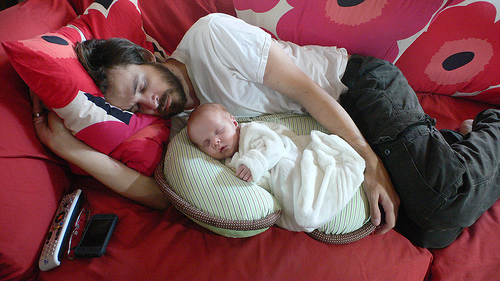
To coincide with our October 2012 issue on pregnancy, a dad (who asked to remain anonymous) who is part of the Baby Cafe community shared some advice for new fathers.
1. Mom will need more support than you think.
Before the baby arrived, our focus was solely on the birth. How would we know if she was in labor? How would we get to the hospital? What if it was the middle of the night? But we thought very little about what it would be like after the baby was born. Yes, we bought the pack and play (where we thought she would sleep), some diapers, bottles, even a breast pump, but the fact is, we had no clue what it would be like to take care of the baby. We just thought labor would be the hard part and it would be (relatively) downhill from there.
But after the baby is born, there is, of course, the joy at having a child, but it can also be very challenging – especially for Mom, who is likely the primary caregiver. Mom will probably need to devote more time than expected to taking care of the baby (try 18 hours a day). This will leave little time for the other parts of her routine that make Mom happy: getting coffee, going to the gym, responding to emails, doing work, and more.
In addition, there will be anxiety. Is the baby ok? Why is she crying? Can she sleep in that position safely? Add in a little sleep deprivation, and it can become just a little bit stressful. In short, Mom will need support: from you, from other family members, from women who have children, and more.
Be prepared for that, and do everything you can to take stress away from her. Take care of the cleaning and cooking, hold the baby when she’s fed but needs to be burped, and other similar measures. And keep telling Mom that she is doing a good job! All of the difficulties are normal and are not a sign that she is doing something wrong or is a bad mother.
2. It can be challenging to get the hang of breastfeeding for both mother and baby.
We thought that, because breastfeeding was natural and babies had done it for centuries, it would be easy to accomplish. In fact, getting the hang of breastfeeding took us about three weeks, and there was a lot of stress and frustration during the process. The baby may hurt Mom, he or she may refuse to take, it may seem that milk isn’t coming (or that too much is), the breasts may become infected, and so on.
I say this not to scare you, but to let you know that you very well may need help and support to get breastfeeding going, and this support will likely have to come from someone who knows breastfeeding (probably not your parents, especially if they didn’t breastfeed you). The number of people who really understand breastfeeding is shockingly low (doctors, for example, do not, and you can expect no support from nurses).
One thing we found is that in breastfeeding the difference between success and complete frustration is very subtle; sometimes, it’s just a slightly different position for the baby that makes the difference between a screaming frustrated infant and a well-fed and happy baby. Get people to help you with these tips and tricks.
By the way, we are now at five weeks and after three to four weeks of various breastfeeding challenges, the baby is now feeding beautifully. Mom is only in pain for the initial latch, and no nipple shields are required. Truly amazing to think we are here after the experience of the first few weeks!
3. You will need help. Don’t be afraid to ask for it.
I’ve probably made things sound more negative than they are; having a baby has been a wonderful and joyous event for our family. But you will need support, and don’t be afraid to ask for it.
Between BJU’s Jennifer [LeCleir] and of course Anne [Hemsley] herself – and all the resources, from books to Chinese breast masseurs that they can introduce you to – there is enough support out there. Make sure to reach out to them. They will reassure you that your experience is totally normal.
If you have a parent who is willing to be with you for a few weeks, by all means take them up on it! Dads, consider an extra long paternity leave. Reach out; you will need help and support, and you should be sure to get it.
Congratulations, and good luck!
Photo by Kelly Sue via Flickr



